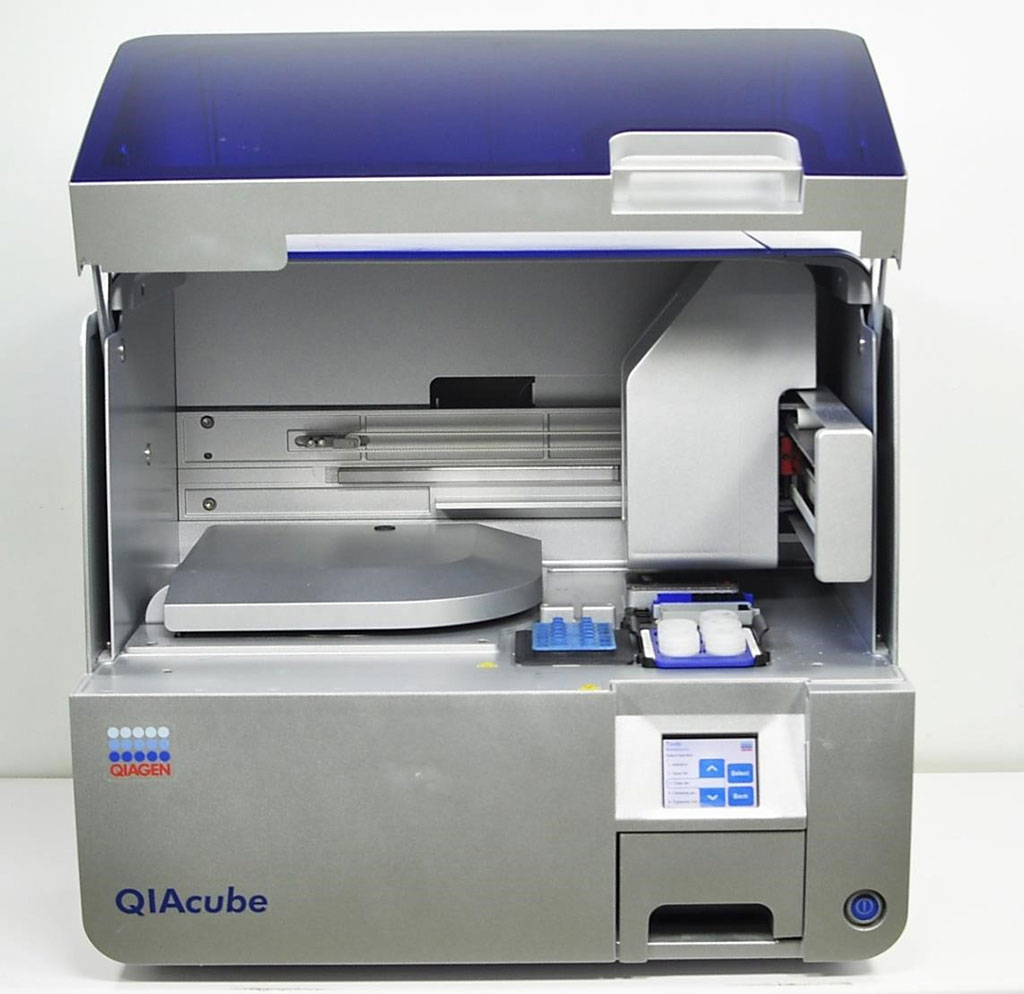PCR Assay Detects and Differentiates Coccidioides Species
By LabMedica International staff writers
Posted on 07 Oct 2021
Coccidioidomycosis (Valley Fever) is a pulmonary and systemic fungal disease with increasing incidence and expanding endemic areas. The differentiation of etiologic agents Coccidioides immitis and C. posadasii remains problematic in the clinical laboratories as conventional PCR and satellite typing schemes are difficult.Posted on 07 Oct 2021
Notable coccidioidomycosis signs and symptoms include a profound feeling of tiredness, loss of smell and taste, fever, cough, headaches, rash, muscle pain, and joint pain. Fatigue can persist for many months after initial infection. The classic triad of coccidioidomycosis known as "desert rheumatism" includes the combination of fever, joint pains, and erythema nodosum.

Image: The QIAcube is an automated system which can extract DNA or RNA from up to 12 samples simultaneously (Photo courtesy of Qiagen)
Mycologists at the Wadsworth Center (New York, NY, USA) and their colleagues analyzed 217 suspected isolates of Coccidioides species, 10 formalin-fixed paraffin-embedded tissues, three vials of rhesus monkey kidney, six lung tissue samples, three cerebrospinal fluids (CSF), two bone marrows, one plural fluid, and one whole blood sample. Seventeen isolates of C. immitis and 15 CSF and pleural fluids, which tested positive for coccidioidomycosis by immunodiffusion and complement fixation, were also included in the study.
The scientists used the Qiagen DNA mini kit on the QIAcube automated extractor (Qiagen, Venlo, The Netherlands) for DNA extraction from all sample types. A modification of conventional diagnostic PCR was used. The PRA2 gene and contig Ci41815/Cp45809 were used to design the duplex real-time PCR assay. The assay specificity was assessed by using an extensive DNA panel comprising various fungi both closely and distantly related to Coccidioides spp. and few bacterial pathogens primarily responsible for causing pulmonary infection. The team developed Cy5- and FAM-labeled TaqMan-probes for duplex real-time PCR assay for rapid differentiation of C. immitis and C. posadasii from culture and clinical specimens.
The investigators reported that the assay was highly sensitive with limit of detection of 0.1 pg gDNA/PCR reaction, which was equivalent to approximately ten genome copies of C. immitis or C. posadasii. The assay was highly specific with no cross-reactivity to the wide range of fungal and bacterial pathogens. Retrospective analysis of fungal isolates and primary specimens submitted from 1995 to 2020 confirmed 168 isolates and four primary specimens as C. posadasii and 30 isolates as C. immitis from human coccidioidomycosis cases, while all eight primary samples from two animals (rhesus monkey and rhinoceros) were confirmed as C. posadasii. A preliminary analysis of cerebrospinal fluid (CSF) and pleural fluid samples showed positive correlation between serology tests and real-time PCR for two of the 15 samples.
The authors concluded that their modified diagnostic conventional PCR assay was excellent for the culture identification of C. immitis and C. posadasii, and the new duplex real-time PCR assay had broader utility for identifying two Coccidioides species from culture and primary specimens. The Coccidioides spp. duplex real-time PCR will allow rapid differentiation of C. immitis and C. posadasii from clinical specimens and further augment coccidioidomycosis treatment and surveillance. The study was published on September 16, 2021 in the journal PLOS Neglected Tropical Diseases.
Related Links:
Wadsworth Center
Qiagen













